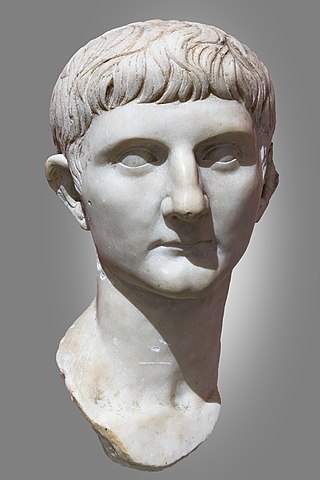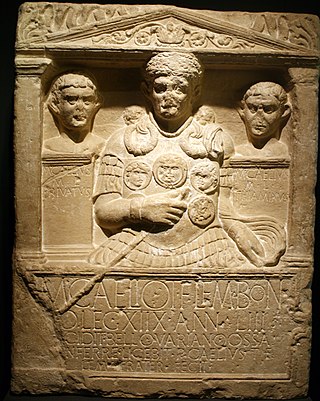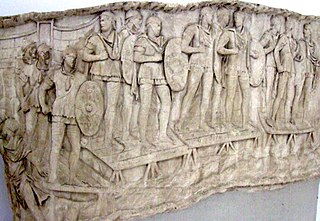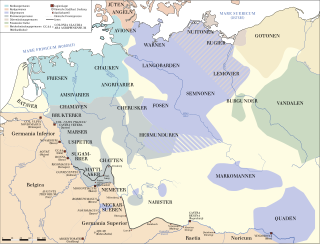| Battle of Baduhenna Wood | |||||||
|---|---|---|---|---|---|---|---|
| Part of the Germanic Wars | |||||||
| |||||||
| Belligerents | |||||||
| Frisii | Roman Empire | ||||||
| Commanders and leaders | |||||||
| Unknown | Lucius Apronius | ||||||
| Strength | |||||||
| Unknown | Unknown | ||||||
| Casualties and losses | |||||||
| Medium | 1,300+ [1] | ||||||
The Battle of Baduhenna Wood [2] was a battle, possibly fought near Heiloo, Netherlands, in 28 AD [3] [4] between the Frisii and a Roman army led by the Roman general Lucius Apronius.
The earliest mention of the Frisii tells of Drusus' 12 BC war against the Rhine Germans and the Chauci. The Romans did not attack them after devastating the lands of the Rhine Germans, but merely passed through their territory and along their coast in order to attack the Chauci. The account says that the Frisii were "won over", suggesting a Roman suzerainty was imposed. [5] When Drusus brought Roman forces through Frisii lands in 12 BC and "won them over", he placed a moderate tax on them. However, a later Roman governor raised the requirements and exacted payment, at first decimating (removing one tenth of) the herds of the Frisii, then confiscating their land, and finally taking wives and children into bondage. By AD 28 the Frisii had had enough. They hanged the Roman soldiers collecting the tax and forced the governor to flee to a Roman fort, which they then besieged.
According to Tacitus:
As soon as this was known to the propraetor of Lower Germany, Lucius Apronius, he summoned from the Upper province the legionary veterans, as well as some picked auxiliary infantry and cavalry. Instantly conveying both armies down the Rhine, he threw them on the Frisii, raising at once the siege of the fortress and dispersing the rebels in defence of their own possessions. Next, he began constructing solid roads and bridges over the neighbouring estuaries for the passage of his heavy troops, and meanwhile having found a ford, he ordered the cavalry of the Canninefates, with all the German infantry which served with us, to take the enemy in the rear. Already in battle array, they were beating back our auxiliary horse as well as that of the legions sent to support them, when three light cohorts, then two more, and after a while the entire cavalry were sent to the attack. They were strong enough, had they charged altogether, but coming up, as they did, at intervals, they did not give fresh courage to the repulsed troops and were themselves carried away in the panic of the fugitives. Apronius entrusted the rest of the auxiliaries to Cethegus Labeo, the commander of the Fifth legion, but he too, finding his men's position critical and being in extreme peril, sent messages imploring the whole strength of the legions. The soldiers of the Fifth sprang forward, drove back the enemy in a fierce encounter, and saved our cohorts and cavalry, who were exhausted by their wounds. But the Roman general did not attempt vengeance or even bury the dead, although many tribunes, prefects, and first-rank centurions had fallen. Soon afterwards it was ascertained from deserters that nine hundred Romans had been cut to pieces in a wood called Baduhenna's, after prolonging the fight to the next day, and that another body of four hundred, which had taken possession of the house of one Cruptorix, once a soldier in our pay, fearing betrayal, had perished by mutual slaughter. Annales, Book iv.72
For whatever reason, the Romans did not seek revenge and the matter was closed. The prestige of the Frisii among the neighboring Germanic tribes was raised considerably. [6]

Germanicus Julius Caesar was an ancient Roman general and politician most famously known for his campaigns in Germania. The son of Nero Claudius Drusus and Antonia the Younger, Germanicus was born into an influential branch of the patrician gens Claudia. The agnomen Germanicus was added to his full name in 9 BC when it was posthumously awarded to his father in honor of his victories in Germania. In AD 4 he was adopted by his paternal uncle Tiberius, himself the stepson and heir of Germanicus' great-uncle Augustus; ten years later, Tiberius succeeded Augustus as Roman emperor. As a result of his adoption, Germanicus became an official member of the gens Julia, another prominent family, to which he was related on his mother's side. His connection to the Julii Caesares was further consolidated through a marriage between him and Agrippina the Elder, a granddaughter of Augustus. He was also the father of Caligula, the maternal grandfather of Nero, and the older brother of Claudius.

The Battle of the Teutoburg Forest, described as the Varian Disaster by Roman historians, was a major battle between Germanic tribes and the Roman Empire that took place somewhere near modern Kalkriese from September 8–11, 9 AD, when an alliance of Germanic peoples ambushed three Roman legions led by Publius Quinctilius Varus and their auxiliaries. The alliance was led by Arminius, a Germanic officer of Varus's auxilia. Arminius had acquired Roman citizenship and had received a Roman military education, which enabled him to deceive the Roman commander methodically and anticipate the Roman army's tactical responses.

The Chauci were an ancient Germanic tribe living in the low-lying region between the Rivers Ems and Elbe, on both sides of the Weser and ranging as far inland as the upper Weser. Along the coast they lived on artificial mounds called terpen, built high enough to remain dry during the highest tide. A dense population of Chauci lived further inland, and they are presumed to have lived in a manner similar to the lives of the other Germanic peoples of the region.

The Cherusci were a Germanic tribe that inhabited parts of the plains and forests of northwestern Germany in the area of the Weser River and present-day Hanover during the first centuries BC and AD. Roman sources reported they considered themselves kin with other Irmino tribes and claimed common descent from an ancestor called Mannus. During the early Roman Empire under Augustus, the Cherusci first served as allies of Rome and sent sons of their chieftains to receive Roman education and serve in the Roman army as auxiliaries. The Cherusci leader Arminius led a confederation of tribes in the ambush that destroyed three Roman legions in the Teutoburg Forest in AD 9. He was subsequently kept from further damaging Rome by disputes with the Marcomanni and reprisal attacks led by Germanicus. After rebel Cherusci killed Arminius in AD 21, infighting among the royal family led to the highly Romanized line of his brother Flavus coming to power. Following their defeat by the Chatti around AD 88, the Cherusci do not appear in further accounts of the German tribes, apparently being absorbed into the late classical groups such as the Saxons, Thuringians, Franks, Bavarians, and Allemanni.

The Praetorian Guard was an elite unit of the Imperial Roman army that served as personal bodyguards and intelligence agents for the Roman emperors.
Legio I Germanica,, was a legion of the Imperial Roman army, possibly founded in 48 BC by Julius Caesar to fight for him in the civil war against Pompey. The title germanic is a reference to its service in the Germanic Wars, rather than the place of origin of its soldiers. After the Revolt of the Batavi, the remaining men of the Germanica were added to Galba's seventh legion, which became VII Gemina. The emblem of Legio I is unknown, but it was probably Taurus, like all the other legions levied by Caesar.
Legio XXI Rapax was a legion of the Imperial Roman army. The symbol of the legion is thought to have been a capricorn.

The Revolt of the Batavi took place in the Roman province of Germania Inferior between AD 69 and 70. It was an uprising against the Roman Empire started by the Batavi, a small but militarily powerful Germanic tribe that inhabited Batavia, on the delta of the river Rhine. They were soon joined by the Celtic tribes from Gallia Belgica and some Germanic tribes.

The Ampsivarii, sometimes referenced by modern writers as Ampsivari, were a Germanic tribe mentioned by ancient authors.

The Usipetes or Usipii were an ancient tribe who moved into the area on the right bank of the lower Rhine in the first century BC, putting them in contact with Gaul and the Roman empire. They are known first from the surviving works of ancient authors such as Julius Caesar and Tacitus. They appear to have moved position several times before disappearing from the historical record.

Drusus Julius Caesar was the son of Emperor Tiberius, and heir to the Roman Empire following the death of his adoptive brother Germanicus in AD 19.

The Angrivarii were a Germanic people of the early Roman Empire, who lived in what is now northwest Germany near the middle of the Weser river. They were mentioned by the Roman authors Tacitus and Ptolemy.

The Frisii were an ancient non-Germanic tribe, living in the low-lying region between the Rhine–Meuse–Scheldt delta and the River Ems, sharing some cultural and linguistic elements with the neighbouring Celts. The newly formed marshlands were largely uninhabitated until the 6th of 5th centuries BC, when inland settlers started to colonize the area. As sea levels rose and flooding risks increased, the inhabitants learned to build their houses on village mounds or terps. The way of life and material culture of the Frisii hardly distinguished itself from the customs of the Chaucian tribes living farther east. The latter, however, were considered to be part of the Germanic tribal confederation.

The auxilia were introduced as non-citizen troops attached to the citizen legions by Augustus after his reorganisation of the Imperial Roman army from 27 BC. By the 2nd century, the Auxilia contained the same number of infantry as the legions and, in addition, provided almost all of the Roman army's cavalry and more specialised troops. The auxilia thus represented three-fifths of Rome's regular land forces at that time. Like their legionary counterparts, auxiliary recruits were mostly volunteers, not conscripts.
Lucius Apronius was a Roman senator and suffect consul in 8 AD.
The Roman–Parthian War of 58–63 or the War of the Armenian Succession was fought between the Roman Empire and the Parthian Empire over control of Armenia, a vital buffer state between the two realms. Armenia had been a Roman client state since the days of Emperor Augustus, but in 52/53, the Parthians succeeded in installing their own candidate, Tiridates, on the Armenian throne.
The gens Apronia was a plebeian family at ancient Rome throughout the history of the Republic and into imperial times. The first member of the gens to achieve prominence was Gaius Apronius, tribune of the plebs in 449 BC. None of the Apronii obtained the consulship until the first century AD.

For around 450 years, from around 55 BC to around 410 AD, the southern part of the Netherlands was integrated into the Roman Empire. During this time the Romans in the Netherlands had an enormous influence on the lives and culture of the people who lived in the Netherlands at the time and (indirectly) on the generations that followed.
Aulus Caecina Severus was a Roman politician and general who was consul in 1 BC. He was Emperor Augustus' representative in Moesia when the Great Illyrian Revolt broke out. As a result, he spent 4 years in heavy fighting against the Illyrian tribes before the revolt was suppressed by the Romans. In 14 AD he was in charge of several legions on the lower Rhine which mutinied on the death of Augustus. He was recorded as having handled this poorly, with the situation only being salvaged by the intervention of his commander-in-chief, Germanicus.

The Roman campaigns in Germania were a series of conflicts between the Germanic tribes and the Roman Empire. Tensions between the Germanic tribes and the Romans began as early as 17/16 BC with the Clades Lolliana, where the 5th Legion under Marcus Lollius was defeated by the tribes Sicambri, Usipetes, and Tencteri. Roman Emperor Augustus responded by rapidly developing military infrastructure across Gaul. His general, Nero Claudius Drusus, began building forts along the Rhine in 13 BC and launched a retaliatory campaign across the Rhine in 12 BC.